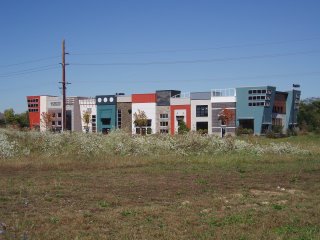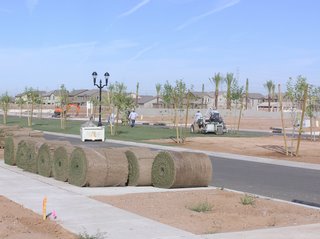You have no doubt heard me complain from time to time that the newspapers are zealous in their pursuit of the doom and gloom scenario for the housing market. They didn't seem quite as ebullient in their coverage of the frantic runup in the market. "Frantic" or "frenzied" is the word I see most often used to describe that ascent, as the writers look back. There is the age-old question of how much the coverage -exaggerated or muted - influences the populace, but that isn't the topic for a neighborly chat. Rather, I think we ought to talk about where we are in the housing market and what the future portends.
Being an accountant, I prefer to talk in numbers; I love charts and graphs (if you must have pictures), and just the facts laid out. It comes as no surprise, therefore, that my favorite "dead-tree" source of news is the Wall Street Journal (although, frankly, I actually read the online version of the WSJ). This is a subscription-only version, so I can't link to the source, but today's WSJ presents a balanced, number-laden article on the housing market. This is based on a study done by a research firm in PA called Moody's
economy.com; the study makes some predictions about the decline of median prices, when the market peaked in various cities and when it will hit bottom in those cities. This is a tricky area to predict, and the author admits that, which is refreshing. Here are a few salient paragraphs(I won't put in the graphs and numbers - I've learned over the years that not everyone enjoys those the same way I do; I don't know what gave me the clue - folks' eyes glazing over, or maybe when they would just walk away in mid-conversation...):
Buyers and sellers can use forecasts from Economy.com and others for guidance as they try to figure out how to play this tricky market. But because the reports don't agree on which markets will be the weakest or how severe the slump will be, they could also be left scratching their heads.
While various studies generally agree that some of the biggest risks of declines are in California and Florida, there are striking differences, reflecting different forecasting methods. For instance, a recent "risk index" study published by PMI Mortgage Insurance Co. ranks the Boston metro area as the seventh-riskiest in the nation in terms of the likelihood of price declines over the next two years. But Economy.com says that home prices in Boston likely bottomed out in this year's third quarter after a modest 2.2% decline.
No study, of course, can tell exactly how bad the market will get or when it will hit bottom. Even if accurate, a prediction for a metro area won't hold true for all neighborhoods or all types of housing.
The good news, according to Economy.com's chief economist, Mark Zandi, is that the current downturn so far looks more like a correction than a crash on a national scale, slowing economic growth but not tipping the economy into a recession. The bad news is that falling prices could be very painful for some people who have bought homes near peak levels over the past year or so in such areas as California, Arizona, Nevada, Florida, Washington, D.C., and the coastal Northeast.
Housing markets in most of these areas began turning down about a year ago after prices more than doubled in many cities during a frantic five-year buying spree. It still isn't clear how hard the landing will be.
The results of this study for the Phoenix market indicate that we hit our peak in the first quarter of 2006 and might not bottom out until the second quarter of 2008. The Mister, as well as our residential broker, strongly disagree with this assessment. They see signs of things turning around already, and expect to see the market on solid footing within 6 months - in Phoenix, of course, not nationally. The Mister's comment was that the study doesn't understand the Phoenix market, which is a little different from others. What factors were used in this study to come to these conclusions?
Economy.com based its price forecasts on a broad range of factors including demographic trends, job markets, mortgage rates, lending standards, construction costs and limits on land development. Mr. Zandi says the economic model doesn't take into account the supply of previously occupied homes available for sale because there aren't enough reliable data on that nationwide.
Previously occupied homes influence our market as much as demographic trends, in my opinion; that's a vital piece of information to leave out of the study. Our market was buoyed by the influx of investors, but they didn't get as strong a foothold in the Phoenix market as they did in the Las Vegas market, and therefore their departure didn't hit our market as hard as the market in Las Vegas.
Bringing the view even closer than the Phoenix market, Gilbert has seen housing sales slow, both in new homes and in re-sales. And even closer, you will notice many more For Sale signs in front yards of homes in Morrison Ranch - staying up longer - than a year ago. Folks are adjusting their expectations to match the market ("oh darn, if I'd sold a year ago, I'd have doubled my money!" has given way to "I've lowered the price again, now I only expect a 45% profit") and once again starting to look at houses as a place to live and raise a family rather than as a quick-turning investment. In my opinion, this is - as the WSJ says in the paragraphs above - a correction, not a crash. I am sorry for my neighbors who have had to move and are experiencing delay in selling their houses. Over the long run for those of us still living here, it is better for our community that homes are valued at a reasonable price (appreciating, of course!), available to those folks who value the neighborly feel and want to live here.
I think we're special, both in the Phoenix market and in Morrison Ranch. There's no denying the decrease in the housing market; but in the long run this will be the basis for a healthier market.
Do remember that you are listening to the opining of a middle-aged woman sitting on her front porch with a cup of coffee (okay, I'm actually at my desk behind the computer, but you know what I mean). Not a realtor. Nor even a statistician. Definitely not a reporter. But I do hang out with folks that are smarter than me in this area; and this is my take on the situation.
More coffee?




 This is my favorite of the pictures he took:
This is my favorite of the pictures he took:









